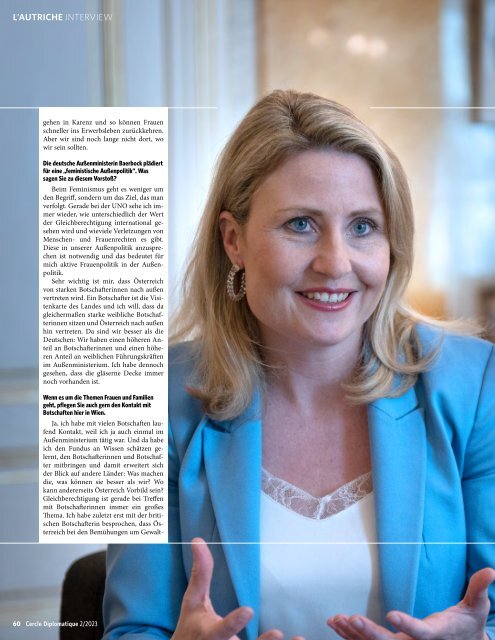CERCLE DIPLOMATIQUE - issue 02/2023
CD is an independent and impartial magazine and is the medium of communication between foreign representatives of international and UN-organisations based in Vienna and the Austrian political classes, business, culture and tourism. CD features up-to-date information about and for the diplomatic corps, international organisations, society, politics, business, tourism, fashion and culture. Furthermore CD introduces the new ambassadors in Austria and informs about designations, awards and top-events. Interviews with leading personalities, country reports from all over the world and the presentation of Austria as a host country complement the wide range oft he magazine.
CD is an independent and impartial magazine and is the medium of communication between foreign representatives of international and UN-organisations based in Vienna and the Austrian political classes, business, culture and tourism. CD features up-to-date information about and for the diplomatic corps, international organisations, society, politics, business, tourism, fashion and culture. Furthermore CD introduces the new ambassadors in Austria and informs about designations, awards and top-events. Interviews with leading personalities, country reports from all over the world and the presentation of Austria as a host country complement the wide range oft he magazine.
Create successful ePaper yourself
Turn your PDF publications into a flip-book with our unique Google optimized e-Paper software.
L’AUTRICHE INTERVIEW<br />
gehen in Karenz und so können Frauen<br />
schneller ins Erwerbsleben zurückkehren.<br />
Aber wir sind noch lange nicht dort, wo<br />
wir sein sollten.<br />
Die deutsche Außenministerin Baerbock plädiert<br />
für eine „feministische Außenpolitik“. Was<br />
sagen Sie zu diesem Vorstoß?<br />
Beim Feminismus geht es weniger um<br />
den Begriff, sondern um das Ziel, das man<br />
verfolgt. Gerade bei der UNO sehe ich immer<br />
wieder, wie unterschiedlich der Wert<br />
der Gleichberechtigung international gesehen<br />
wird und wieviele Verletzungen von<br />
Menschen- und Frauenrechten es gibt.<br />
Diese in unserer Außenpolitik anzusprechen<br />
ist notwendig und das bedeutet für<br />
mich aktive Frauenpolitik in der Außenpolitik.<br />
Sehr wichtig ist mir, dass Österreich<br />
von starken Botschafterinnen nach außen<br />
vertreten wird. Ein Botschafter ist die Visitenkarte<br />
des Landes und ich will, dass da<br />
gleichermaßen starke weibliche Botschafterinnen<br />
sitzen und Österreich nach außen<br />
hin vertreten. Da sind wir besser als die<br />
Deutschen: Wir haben einen höheren Anteil<br />
an Botschafterinnen und einen höheren<br />
Anteil an weiblichen Führungskräften<br />
im Außenministerium. Ich habe dennoch<br />
gesehen, dass die gläserne Decke immer<br />
noch vorhanden ist.<br />
Wenn es um die Themen Frauen und Familien<br />
geht, pflegen Sie auch gern den Kontakt mit<br />
Botschaften hier in Wien.<br />
Ja, ich habe mit vielen Botschaften laufend<br />
Kontakt, weil ich ja auch einmal im<br />
Außenministerium tätig war. Und da habe<br />
ich den Fundus an Wissen schätzen gelernt,<br />
den Botschafterinnen und Botschafter<br />
mitbringen und damit erweitert sich<br />
der Blick auf andere Länder: Was machen<br />
die, was können sie besser als wir? Wo<br />
kann andererseits Österreich Vorbild sein?<br />
Gleichberechtigung ist gerade bei Treffen<br />
mit Botschafterinnen immer ein großes<br />
Thema. Ich habe zuletzt erst mit der britischen<br />
Botschafterin besprochen, dass Österreich<br />
bei den Bemühungen um Gewalt-<br />
PHOTOS: XYXXYXYXY<br />
PHOTOS: RALPH MANFREDA<br />
schutz für Frauen ein Vorreiter ist. Wir<br />
haben das erste Gewaltschutzgesetz in Europa<br />
gehabt und da bin ich stolz darauf.<br />
Wir haben gerade jetzt neue Initiativen<br />
gestartet beim Gewaltschutz, beim Ausbau<br />
von Infrastruktur, bei Beratungsstellen,<br />
bei neuen Frauenzentren.<br />
Wie bewerten Sie als zuständige Ministerin die<br />
jüngsten Debatten über Probleme bei der<br />
Integration von Migranten?<br />
Ich bin seit über zehn Jahren im Integrationsbereich<br />
tätig: im Innenministerium,<br />
Außenministerium und jetzt als Ministerin.<br />
Ich denke, dass Österreich bei der<br />
Integration viel geleistet hat. Integration<br />
ist nicht schwarz-weiß, es ist nicht alles<br />
nur gut oder schlecht. Integration ist unterschiedlich,<br />
je nachdem, was jeder Einzelne<br />
gewillt ist beizutragen. Erfolgreiche<br />
Integration hängt aber auch immer von<br />
der Anzahl der Menschen ab, die nach Österreich<br />
kommen. 2015/16 hatten wir eine<br />
große Anzahl an neu ankommenden<br />
Flüchtlingen in Österreich. Das waren riesige<br />
Herausforderungen – und sie sind es<br />
nach wie vor. Wir sehen, dass viele der<br />
Menschen, vor allem Frauen, noch immer<br />
nicht am Arbeitsmarkt reüssiert haben.<br />
Zusätzlich sind zuletzt viele Menschen<br />
aus der Ukraine zu uns gekommen. Da<br />
sehe ich aber, dass die Integration viel<br />
leichter geht, dass die Menschen innerhalb<br />
von einem Jahr wirklich gut Deutsch gelernt<br />
haben und dass sie ein hohes Maß an<br />
Qualifikationen mitbringen und damit<br />
leichter Arbeit finden. Das ist ganz zentral<br />
für die Integration, denn damit sind sie<br />
selbsterhaltungsfähig.<br />
Ist Integration in Großstädten wie Wien<br />
schwieriger als am Land?<br />
In den Großstädten, wo es einen sehr<br />
starken Zuzug gibt, wo immer mehr Menschen,<br />
die nicht Deutsch sprechen, in einem<br />
Grätzel wohnen, ist es mit der Integration<br />
sehr schwierig, weil der Kontakt zu<br />
Österreichern geringer ist. Ein Schlüssel<br />
für Integration ist, dass man diese segregierten<br />
Milieus aufbricht, dass man den<br />
Zuzug insgesamt reduziert. Über viele<br />
Jahrzehnte hat man geglaubt, dass alle nur<br />
genügend tolerant sein müssen, dann wird<br />
sich das mit der Integration schon lösen.<br />
Das ist es aber nicht. Denn Integration<br />
funktioniert nur, wenn es auch Integrationsverpflichtungen<br />
gibt. Wir haben 2017<br />
verpflichtende Deutschkurse, Wertekurse<br />
und Integrationsberatungen eingeführt.<br />
Integration bedeutet fördern und fordern.<br />
So schafft man es auch.<br />
CD: Recently, in your capacity as Minister for<br />
Women, you spoke at the United Nations in New<br />
York. Where does Austria’s women’s policy stand<br />
in international comparison?<br />
Susanne Raab: The women ministers<br />
of the UN member states meet annually<br />
around International Women’s Day. This<br />
platform shows how diverse the challenges<br />
in women’s policy are worldwide. There<br />
are countries where women are valued less<br />
than men, where forced marriages occur<br />
and where women are monitored by the<br />
police with video cameras, as is the case in<br />
Iran, to check if they are wearing their<br />
headscarves. Fundamental human rights<br />
are violated in such cases, and it is our task<br />
to condemn them together. Women ministers<br />
from the European Union form a very<br />
close network. This is because we share<br />
common values and aspirations regarding<br />
gender equality between men and women.<br />
What are the key criteria for effective gender<br />
equality policies?<br />
Effective gender equality policies cannot<br />
be solely implemented by the Ministry<br />
for Women; they must permeate all areas<br />
of society and involve all ministries. It is<br />
important for the police to handle cases of<br />
domestic violence with sensitivity. It is important<br />
for the judiciary to approach custody<br />
arrangements with sensitivity. It is important<br />
for the Ministry of Labour to<br />
implement the right measures to reintegrate<br />
women into the workforce. The Ministry<br />
for Women plays a coordinating role,<br />
and it is crucial for the government to have<br />
an awareness that it can only be achieved<br />
together. Furthermore, it is important to<br />
me that gender equality policies do not<br />
impose a specific way of life on women.<br />
Instead, every woman should have the<br />
right conditions in place to express herself<br />
with all her desires and needs.<br />
Lastly, gender equality policies are not<br />
about being against men; we need men by<br />
our side. We can only succeed as a society<br />
when women are equally represented in all<br />
positions, have an equal voice, and naturally<br />
earn the same amount with equal<br />
qualifications. These are my guidelines.<br />
You mentioned the <strong>issue</strong> of unequal pay; the<br />
gender pay gap. Why hasn’t the problem been<br />
solved yet?<br />
It is improving, the trend has been heading<br />
in the right direction for several years<br />
now. However, the high wage disparity between<br />
women and men still exists for several<br />
reasons. One factor is career choice. Women<br />
often work in poorly paid industries. I<br />
am working to encourage girls and women<br />
to take an interest in higher-paying fields<br />
such as technology, science, and mathematics.<br />
Another factor is motherhood, which<br />
often leads to longer parental leave and<br />
more time spent in part-time work. This<br />
negatively affects lifetime earnings and results<br />
in women receiving lower pensions<br />
than men. I also see a societal shift happening:<br />
Today, families are sharing parental<br />
leave more equally, with more men taking<br />
leave, allowing women to return to the<br />
workforce more quickly. But we are still far<br />
from where we should be.<br />
What is your opinion on German Foreign Minister<br />
Baerbock’s call for “feminist foreign policy”?<br />
When it comes to feminism, it is less<br />
about the term itself and more about the<br />
goal one pursues. Particularly at the United<br />
Nations, I constantly witness how differently<br />
the value of gender equality is perceived<br />
internationally and how many<br />
violations of human and women’s rights<br />
exist. Addressing these <strong>issue</strong>s in our for-<br />
Multi-Ministerin Raab im<br />
Gespräch mit CD-Autor<br />
Gerhard Bitzan.<br />
Multi-minister Raab in<br />
conversation with CD author<br />
Gerhard Bitzan.<br />
60<br />
Cercle Diplomatique 2/2<strong>02</strong>3<br />
Cercle Diplomatique 2/2<strong>02</strong>3<br />
61
















